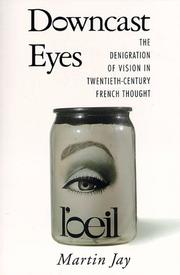| Listing 1 - 1 of 1 |
Sort by
|

ISBN: 1283646234 0520915380 0585200467 9780520915381 9780585200460 0520081544 9780520088856 9780520081543 0520088859 Year: 1993 Publisher: Berkeley Los Angeles London : University of California Press,
Abstract | Keywords | Export | Availability | Bookmark
 Loading...
Loading...Choose an application
- Reference Manager
- EndNote
- RefWorks (Direct export to RefWorks)
Long considered "the noblest of the senses," vision has increasingly come under critical scrutiny by a wide range of thinkers who question its dominance in Western culture. These critics of vision, especially prominent in twentieth-century France, have challenged its allegedly superior capacity to provide access to the world. They have also criticized its supposed complicity with political and social oppression through the promulgation of spectacle and surveillance. Martin Jay turns to this discourse surrounding vision and explores its often contradictory implications in the work of such influential figures as Jean-Paul Sartre, Maurice Merleau-Ponty, Michel Foucault, Jacques Lacan, Louis Althusser, Guy Debord, Luce Irigaray, Emmanuel Levinas, and Jacques Derrida. Jay begins with a discussion of the theory of vision from Plato to Descartes, then considers its role in the French Enlightenment before turning to its status in the culture of modernity. From consideration of French Impressionism to analysis of Georges Bataille and the Surrealists, Roland Barthes's writings on photography, and the film theory of Christian Metz, Jay provides lucid and fair-minded accounts of thinkers and ideas widely known for their difficulty. His book examines the myriad links between the interrogation of vision and the pervasive antihumanist, antimodernist, and counter-enlightenment tenor of much recent French thought. Refusing, however, to defend the dominant visual order, he calls instead for a plurality of "scopic regimes." Certain to generate controversy and discussion throughout the humanities and social sciences, Downcast Eyes will consolidate Jay's reputation as one of today's premier cultural and intellectual historians.
Vision. --- Cognition and culture. --- Philosophy, French --- Eyesight --- Seeing --- Sight --- Senses and sensation --- Blindfolds --- Eye --- Physiological optics --- Culture and cognition --- Cognition --- Culture --- Ethnophilosophy --- Ethnopsychology --- Socialization --- France --- Civilization --- Intellectual life --- Cognition and culture --- Vision --- Perception (Philosophy) --- Philosophie française --- Cognition et culture --- Perception (Philosophie) --- History --- Philosophy --- Histoire --- Philosophie --- Civilisation --- Vie intellectuelle --- CDL --- 130.2 --- 20th century. --- 5 senses. --- academic. --- criticism. --- cultural history. --- cultural studies. --- culture. --- descartes. --- disability studies. --- emmanuel levinas. --- enlightenment. --- five senses. --- france. --- french enlightenment. --- global. --- guy debord. --- jacques derrida. --- jacques lacan. --- jean paul sartre. --- louis althusser. --- luce irigaray. --- maurice merleau ponty. --- michel foucault. --- modernity. --- oppression. --- plato. --- political. --- politics. --- scholarly. --- seeing. --- sight. --- social history. --- social studies. --- surveillance. --- theory. --- vision impaired. --- vision. --- western culture. --- western world. --- Perception (philosophie) --- Image (philosophie) --- 1870-1914 --- 20e siècle
| Listing 1 - 1 of 1 |
Sort by
|

 Search
Search Feedback
Feedback About UniCat
About UniCat  Help
Help News
News